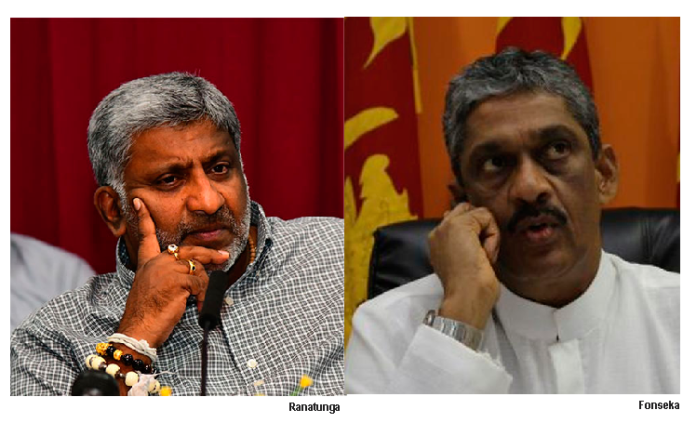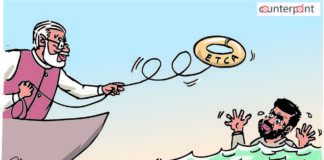By Vishvanath
Both the SLPP and the SJB are experiencing intraparty disputes, the last thing any political party wants in the run-up to a crucial election, which it cannot afford to lose.
Differences between SJB Chairman Field Marshal Sarath Fonseka and his party leader, Sajith Premadasa, have come to a head, with the loyalists of the latter carrying out vitriolic attacks on the former. Fonseka has complained in Parliament that Chief Opposition Whip Lakshman Kiriella refuses to allocate time for him to speak in the House as he is critical of the party leader. He told the parliament the other day that the ruling party had allowed him to use some of its time to speak. He took swipes at Premadasa much to the glee of the government MPs, claiming that the latter was not fit to be the President. The SJB cannot see the back of Fonseka because he has moved court against its decision to get rid of him.
Going by the manner in which Fonseka is attacking Premadasa, he is likely to break ranks with the SJB. He is expected to throw in his lot with President Ranil Wickremesinghe, but he has not given any indication that he will do so.
The Rajapaksas on the offensive
SLPP founder Basil Rajapaksa, described as the party’s chief strategist, lost his temper and berated Chief Government Whip and Minister Prasanna Ranatunga last week while they were having talks with President Wickremesinghe on the upcoming presidential election. What got Basil’s goat, so to speak, was a remark by Ranatunga that it was advisable for the President to form an alliance with the SLPP without the Rajapaksas. Basil loyalist and SLPP MP Sanjeewa Edirimanna, taking part in an interview with Hiru TV, tore into the SLPP MPs who, he said,had opposed the appointment of Wickremesinghe as the Prime Minister and his subsequent election as the President in the parliament in 2022 but were were now calling for a coming together between the UNP and the SLPP without the Rajapaksa family. Edirimanne accused them of having striven to field someone other than a member of the Rajapaksa family in the 2019 presidential election. He did not name names, but it was obvious that his reference was to Minister Ranatunga and otherSLPP dissidents who are still in the government parliamentary group.
Ranatunga and other SLPP MPs loyal to the President do not want the Rajapaksas to be part of the electoral alliance to be formed apparently for two reasons. Public opinion has turned against the members of the Rajapaksa family, and it will be disadvantageous for the President to have them as partners, for in doing so, he will alienate a lot of voters, especially those whobelong to minority communities. The SLPP dissidents who have switched their allegiance to the President also seem to think that they will lose their bargaining power if the President opts for an alliance with the SLPP controlled by the Rajapaksas; they will continue to be under the thumb of the Rajapaksa family in such an eventuality. Basil cannot be unaware that if his family is left out of the alliance to be forged, they will have their work cut out to make a comeback in the foreseeable future.
Season of crossovers
Speculation is rife in political circles that there will be some more crossovers from the SLPP and the Opposition in support of President Wickremesinghe in the next weeks although the SJB says it is confident that none of its MPs will defect.
Elections are usually times when Sri Lankan politicians amply demonstrate their jumping skills, in a manner of speaking. They are characterized by numerous crossovers, including very high-profile ones, in some cases. Defections however are not limited to leads-up to polls. Governments have collapsed due to mid-term crossovers.
In December 1964, Deputy Leader of the SLFP, Leader of the House and Cabinet Minister, C. P. de Silva, crossed the floor of the House, followed by 13 others, during the Throne Speech, bringing down Prime Minister Sirima Bandaranaike’s government, which was set to take over Lake House; the SLFP also had formed an alliance with leftists much to the resentment of some of its seniors. The SLFP was defeated at the 1965 general election, which led to the election of a UNP government led by Prime Minister Dudley Senanayake. In October 2001, SLFP General Secretary and Cabinet Minister S. B. Dissanayake defected to the UNP together with seven others, causing the SLFP-led People’s Alliance (UPFA) government to fall. The UPFA lost the 2001 snap election, and the UNP returned to power with Ranil Wickremesinghe as the Prime Minister.
In 2007, the UNP was very confident that it would be able to bring down the UPFA government of President Mahinda Rajapaksa by engineering mass crossovers, but its plan went awry because the JVP, which had 39 MPs abstained from voting, and some of the UPFA MPs who had promised to cross over got cold feet. Cabinet Minister Anura Bandaranaike, however, defected to the UNP but it hardly had any impact on the stability of that administration. The UPFA government won the 2007 budget vote comfortably with a majority of 47 votes.
Crossovers have also helped strengthen weak governments. In January 2007, UNP MP Karu Jayasuriya and 19 other Opposition MPs defected to President Mahinda Rajapaksa’s UPFA government, which was struggling to retain aparliamentary majority, during the war against the LTTE. President Rajapaksa appointed most of the crossovers ministers, and as a result there were as many 104 ministers or deputy ministers in the 225-member parliament! Jayasuriya returned to the UNP’s fold the following year.
It is crossovers from the Opposition that have helped the incumbent SLPP retain a working majority in the current parliament since the breakaway of dozens of its dissident MPs.
Top guns as fifth columnists
Sri Lanka’s post-Independence political history is full of instances where fifth columnists in political parties were foundto be their top guns. Like C. P de Silva, who turned against the SLFP while being its Deputy Leader and the Leader of the House, in 2001, S. B. Dissanayake was the SLFP General Secretary when he defected to the UNP with a group of Ministers. Jayasuriya was the de facto second-in-command in the UNP when he joined forces with the Mahinda Rajapaksa government in 2007. Wimal Weerawansa was the JVP’s Propaganda Secretary and parliamentary group leader when he fell out with the party leadership and quit, preempting an attempt to sack him. Maithripala Sirisena defected to the Opposition in November 2014 to challenge President Rajapaksa in the presidential race while being the SLFP General Secretary. The Rajapaksa government retaliated by engineering the defection of Tissa Attanayake, who was the UNP General Secretary at the time. Prof. G. L. Peiris was the Chairman of the SLPP when he rebelled against the party leadership and voted with his feet in 2022.
Now, it is being speculated that SJB Chairman Fonseka and Chief Government Whip Ranatunga are likely to break ranks with their parties in time for the upcoming presidential election.
Nothing can be ruled out in Sri Lankan politics, where self-interest takes precedence over everything else. Whoever would have thought the Rajapaksa family and Wickremesinghe would ever make common cause with the SLPP and the UNP opting for a political marriage?



 Logging you in...
Logging you in... Loading IntenseDebate Comments...
Loading IntenseDebate Comments...

